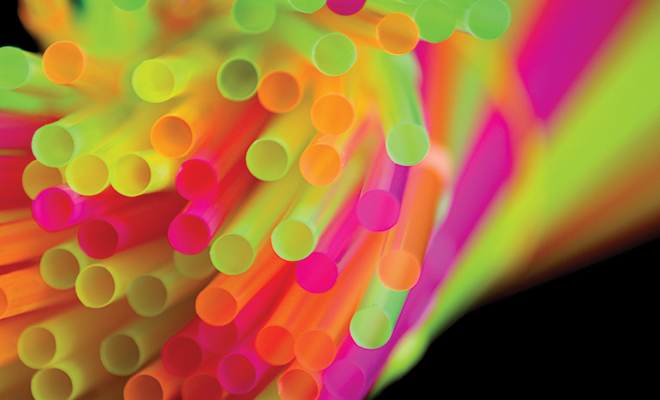
The Disappearance of Straws
Plastic straws have become ubiquitous in restaurants and bars since their introduction in the 1960s, replacing paper straws that became soggy in sodas and milkshakes.
A plastic drinking straw may seem like a small thing, but the National Park Service estimates that more than 500 million straws are used and disposed of each day in the United States. When even a small portion of these straws are scattered on our nation’s beaches and wash into oceans and waterways, the damage can be significant. They have been found embedded in the bodies of sea turtles, birds, fish and even whales.
Straws are one piece of a much bigger environmental problem caused by plastics. Although many people assume that straws can be recycled, their size makes it nearly impossible to process them in a recycling plant. When plastic straws make their way into rivers and oceans, joining plastic bottles, bottle tops, containers and cutlery, they eventually break down into microscopic particles that impact every level of the food chain. Ongoing scientific studies suggest that these particles could soon affect human health as they show up in our food sources.
Environmental activists have targeted drinking straws because they are one disposable plastic item that may be possible to eliminate. Their campaign has been aided by a viral YouTube video from 2015 showing a sea turtle with a plastic straw stuck in its snout. Although a few people may require straws because of medical problems, the majority of people can make do without a straw or they can invest in a reusable straw made from stainless steel or bamboo. Some restaurants are even deciding to return to old-school paper straws. Cities are getting involved in the fight against plastic pollution and banning plastic straws, with Seattle outlawing their use by restaurants and other businesses in 2018 and Washington, D.C., following suit in 2019.
Plastics straws are just one little piece of the 18 billion pounds of plastic waste that enters the world’s oceans each year. Much of this is due to single-use plastics—the cutlery, bottles, packaging and bags that are used just once and then discarded. National Geographic reports that about 40 percent of all plastic produced in the world is destined to be used only once and then thrown away, with only about a fifth of discarded plastic currently being recycled. Unlike climate change, a problem that many prominent individuals deny exists, there’s no denying the looming catastrophe caused by discarded plastic objects.
There are several things that can be done to cut down on plastics pollution, including legislation targeting single-use products. In 2014, California became the first state to pass a law banning single-use bags at large retail stores. The state also imposed a dime charge for paper bags and reusable plastic bags. Hawaii followed with legislation prohibiting non-biodegradable plastic bags in stores.
Major American cities that have passed laws to discourage the use of plastic bags by retailers, including Seattle, Boston and Washington, D.C. Seattle has also banned the use of non-compostable plastic straws and utensils in restaurants and bars. Legal bans on plastic bags have been met with opposition from the plastics industry. Intense lobbying by professional groups such as the American Chemical Council and the American Progressive Bag Alliance has led to legislation that protects the use of plastic bags in Florida, Idaho, Missouri and several other states.
The Plastic Pollution Coalition is a global alliance of businesses, organizations and activists that was founded in 2009 to address pollution caused by single-use plastic products. The group’s motto is “Plastic is a substance the world cannot digest. Refuse Single-Use Plastic.” The organization reports that even though some single-use plastics are biodegradable, these products rarely make it to a recycling center where the conditions allow recycling. Also, recycling facilities don’t exist in many countries around the world where plastics pollution is heaviest. In response, the organization is pressuring fast-food companies to commit to eliminating plastic straws and bags as well as foam cups and food containers.
Unlike the legal actions that have been taken to eliminate plastic straws, the movement against single-use straws has been voluntary. Instead of attempting to change the law, activists are hoping that consumers will stop using plastic straws once they understand the damage these and other single-use plastics cause to the environment and wildlife. Some companies have joined the movement, with Starbucks announcing it will stop handing out plastic straws by 2020. Alaska Airlines and American Airlines have also stated that they will begin phasing out plastic straws. Eliminating plastic straws is one environmental goal that could be achievable, providing hope that larger challenges related to plastic pollution can also be overcome. ■
Sources: rd.com, nationalgeographic.com and washingtonpost.com.







